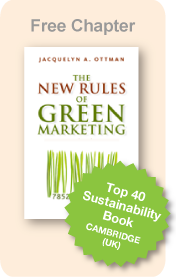Jacquie Ottman's
Green Marketing Blog
A Tale of Two Green Surveys
March 26, 2009 by Jacquelyn Ottman
One recent consumer survey says it is the best of green times; another, the worst of green times. Has trying to protect the environment gone out the window in the current recession - or not?By Jacquelyn Ottman, with Lisa Martin
The 2009 Cone Consumer Environmental Survey, released in February, maintains that, "Consumer interest in environmental purchasing not eclipsed by poor economy." The report finds that 34% of American consumers indicate they are more likely to buy environmentally responsible products today, and another 44% indicate that their environmental shopping habits have not changed as a result of the economy. So, according to Cone, buying green has not been affected, despite the state of our economy. Or has it?
According to new consumer research from Mintel, also released in February, green purchasing has stagnated. Their headline reads, "Mintel finds fewer Americans interested in 'going green' during recession." The number of Americans who say they "almost always" or "regularly buy" green products remains unchanged since last year, at 36%. This comes after tripling the previous year from 12% in 2007 to 36% in 2008. According to Mintel, adopting a greener lifestyle has taken a backseat for consumers with each dollar being stretched to the max.
One survey that we really like is the LOHAS report from the Natural Marketing Institute. NMI finds that 17% of adult consumers fall into their deep green LOHAS (Lifestyles of Health and Sustainability) segment while another 17% are "Naturalites," consumers who focus on natural foods, cleaning products and the life. Put the two segments together andvoila! it adds up to 34% - the same percentage of still green consumers that each of the two surveys discovered.
These conflicting results reflect a case of looking at the glass as half full or half empty.
Green purchasing is holding up among the most ardent green consumers since it is equated to both high quality and health. Women with children are core green consumers and they are troubled by pesticides on their Granny Smiths and concerned about chemicals in their Mr. Clean. Even in a recession, committed greens are investing in the health and well-being of their families.
But sales is where the rubber hits the road. We would be interested to see the actual sales data of greener products across a range of consumer product categories. How's your green business holding up? Please post a comment below and let us know.
Click here to join our mailing list.



 ShareThis
ShareThis

